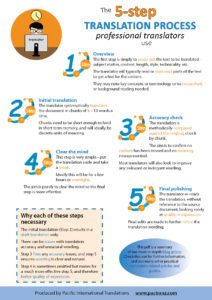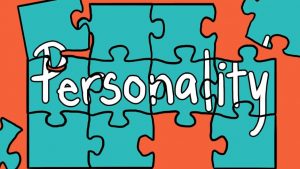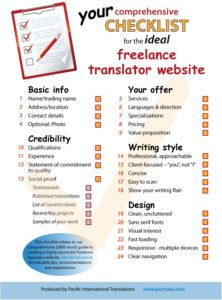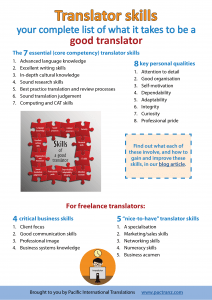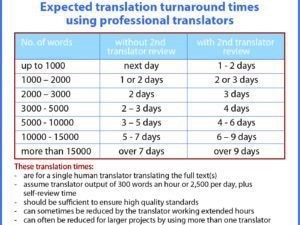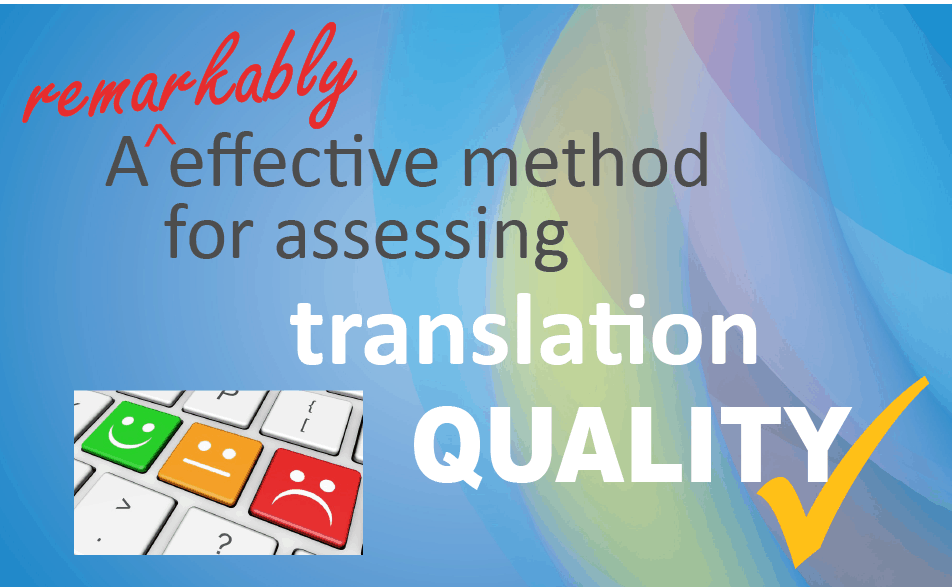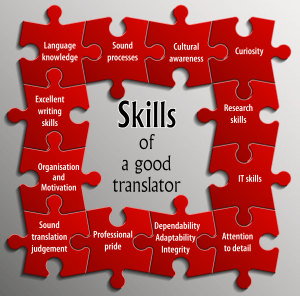
Want to know what it takes to be a good translator?
Here are all the translator skills, abilities and qualities you need to be successful.
We’ve split them into:
- 7 core competency translator skills
- 8 key personal translator qualities
- 4 crucial freelance translator business skills
- 5 “nice-to-have” translator abilities
And best of all, we tell you how to acquire and improve each one.
PLUS, there’s a free summary pdf you can download.
The 7 essential translator skills – your core competency
These are the basic translator skills you need to work as a professional translator.
1. Advanced language knowledge
You can’t translate something unless you understand it.
And if you don’t understand the text fully, you risk misinterpreting it and delivering a translation that’s not completely accurate.
So good translators need to understand all meaning – including all the subtle nuances implied in the text.
That level of understanding requires advanced, near native level, knowledge of your source language.
Nothing less will do.
How to gain advanced language knowledge
- Study – do a degree or other course in your language
- Read widely
- Be an avid consumer of source language media
- Immerse yourself in the culture – visit source-language countries regularly if you live elsewhere
- Keep it up! Language is constantly changing, so it’s an on-going process, not a target to reach then relax
2. Excellent writing skills

You must have a way with words, the ability to write with flair.
And you’ll likely need to do that across a variety of text styles – promotional and marketing, formal/legal, casual, technical, etc.
To some extent you either have excellent writing ability and expression or you don’t.
But it’s also a skill you can hone and improve with experience and application.
How to improve your translator writing skills
- Take a writing course
- Collaborate with your peers – see how they translate things and the wording and expression they use
- Read your translations aloud to pick up any unnatural phrasing, and spend time refining and polishing your wording
- Read widely – it’ll extend your vocabulary
- Note down wording you come across that you really like, and add it to your repertoire
3. In-depth cultural knowledge
Good translators have a deep understanding of both source and target cultures.
That’s general cultural knowledge like values systems and how people view the world.
And culture-specific aspects like pastimes, customs, etc.
You’ll often need cultural knowledge to grasp the significance or implication of text you’re translating.
And understanding the differences between your source and target language cultures will alert you to text that won’t work well or will have reduced impact when translated.
How to extend your cultural knowledge
- Spend time in both target and source culture countries
- Consume media in both languages
- Attend cultural events
- Research aspects of the culture you haven’t personally experienced
4. Sound research skills
Translators are always researching things – wording, meanings, vocab, jargon, background info.
The more efficiently you can do it the better.
How to refine your translation research skills
- Learn the tricks to refining Google searches
- See what your peers do
- Find and bookmark your most useful reference sources
- Ask on translator forums
5. Best practice translation and review processes
Translation is mentally challenging, and it’s dead easy for the odd shortcoming to slip through.
A little inaccuracy here, less than ideal wording there.
That’s why good translators stick like barnacles to proven translation processes.
You need to too.
How to improve your translation processes
- Read this article
- And this one on reviewing translations
- Do a translation course – they’ll drill sound processes into you
- Be disciplined! Don’t rush your translation or be tempted to take shortcuts
- Work with a colleague and peer-review each other’s work
6. Sound translation judgement
Good translators make consistently good translation decisions.
On vocabulary and structures to use, when to be more literal / freer, what and how much to research, etc.
Much of this is instinctive, but with the right effort any translator can markedly improve this basic skill.
How to improve your translation judgement
- Study translation – choose a course that includes tons of translation practice with constructive tutor feedback
- Collaborate with a colleague – critique each other’s work and learn from each other
- Seek out a mentor – an accomplished translator willing to give feedback and help you hone your translation skills
- Self-critique your work. Revisit earlier translations and see how you could improve them
- Gain experience! Generally, the more you translate the better you’ll get – especially if you’re receiving constructive feedback
7. Computing and CAT skills
You’ll need to have good command of commonly used office programs – Word, Excel, PowerPoint, etc
And you should be an expert on your chosen TM software.
How to improve these skills
- Take advantage of Microsoft’s training videos, especially those for Word
- Watch on-line tutorials and YouTube how-to’s
- Search for solutions to specific problems you have or areas where you’re a little weak
- Do a course
- Compare notes with your colleagues for TM productivity tips
8 personal qualities every good translator will have
1. Attention to detail
Without this quality, translators won’t consistently produce fully accurate, well-worded translations
2. Good organisation
Successful translators manage their time well, have good recordkeeping and are efficient in what they do.
3. Self-motivation
The energy and discipline to do what you have to do, and go the extra mile when you need to, can only come from you.
4. Dependability
Clients must be able to rely on you to respond promptly to communications and meet translation deadlines.
5. Adaptability
The quality to take non-standard translation projects and unusual client requests in your stride. And to consider reviewer critiques and suggestions with an open mind.
6. Integrity
To play by the “rules” – maintain confidentiality, observe business and professional ethics, respect your client/supplier relationships.
7. Curiosity
Translators who are naturally curious find all texts interesting, so enjoy every translation project. And people who enjoy their work tend to do a better job.
8. Professional pride
The quality that will spur you to always produce high quality work and present yourself in a professional manner.
Several of these qualities are inherent personality traits of course.
So you’ll either be that type of person or you won’t.
But not all.
For example, most people aren’t super organised. But we can all develop habits to help be more structured and efficient.
Similarly, we can do things to increase our motivation.
How to increase your motivation and be more organised
- The Web is full of articles, tips and guides on how to improve in these areas. Try searching for phrases like:
“how to become more organised”
“how to become more motivated” - Find and adopt any ideas and strategies that’ll work for you.
- Do an online organisation, productivity or time management course, perhaps this one designed specifically for translators.
Watch our video!
We’ve highlighted 4 of the most important translator skills and explain why so few bilinguals have them:
Or check out this slide show:
4 critical business skills every good freelance translator needs
If you’re a freelancer, you’re in business.
So you need certain skills to ensure your translator business is successful.
Here are the 4 most important of them.
1. A client focus
Successful businesspeople look at things from their client’s point of view, ask themselves what their clients really want. Develop that mindset and everything will pretty much fall into line.
Here’s a tip: most translation clients are really just seeking assurance, peace of mind. Assurance you’ll do a good job, and that everything is on track.
So your task is to give them that assurance. Which means:
- Being easy to contact
- Responding promptly
- Always being professional
- Doing what they want whenever possible
- Being proactive in looking after their interests
Do this and your clients will love you!
Tips on how to develop a sharper client focus
It’s an attitude thing, so you first need to decide you’re going to be that type of (business)person.
Then reinforce it until it becomes second nature:
- Before sending any e-mail, ask yourself if it’s what your client would want to receive
- Regularly assess how you’re doing – at day’s end, weekly etc
Make sure your website is client-focused – see how here.
2. Good communication skills
Clarity is key – always take the time to ensure there’s no potential misunderstanding or confusion over what you mean.
Use a business-like tone in written communications.
And be succinct.
As a translator you’re a skilled writer, so this should come naturally to you.
On the phone be polite, friendly and business-like.
3. A professional image
Clients don’t want to deal with anyone who isn’t professional.
Which means you need to project a professional image in everything you do.
And in every component of your business that a client may potentially see.
How to create a professional image
- make sure your e-mails are always well laid out and use a quality signature
- review your website content, focus, and design – see our guide and checklist
- ensure your translations are always nicely formatted and look attractive
- use quality templates for invoicing and quotes
- respond to client requests promptly
- answer the phone quickly and in a professional manner
4. Business systems knowledge
Make sure you have sound basic systems in place for the following – and know what you have to do for each and when:
- Money – banking, invoices, receivables, accounting
- Compliance – any business registration/renewal, fees, returns needed in your jurisdiction
- Security – your website, e-mails, records and files
- Record keeping – all the regulatory requirements plus your working files
How to identify the best systems for you
Simple, ask your colleagues. They’ll already have this sorted, so no need to try and reinvent the wheel.
Ask on on-line translator forums if need be.
5 “nice-to-have” translator abilities
These aren’t strictly necessary to be a successful translator but will make a big difference.
They’re mainly relevant for freelancers.
1. The ability to specialise
Your specialisation may be a domain you have formal qualifications in, a field you’ve worked in, or a subject area you’ve researched.
The advantages to specialisation are:
- familiarity with terminology means less to research so you can often translate faster
- you’ll use the right style
- you can often charge more
- it can be easier to target and market to new clients
How to develop a specialisation:
- Get a formal qualification in your chosen field
- Research and study a subject area in depth until you’re an expert in it
- Read industry publications, blogs and information sites to keep abreast of developments and new terminology
- Find or create your own specialist glossaries
2. Marketing/sales ability

Fortunately, help is at hand from your experienced colleagues.
We recommend:
3. Networking ability
Most of us are reluctant networkers, even though we know it can improve our business.
But it’s one of those things that when you finally get around to doing it, you’ll generally find it isn’t as bad as you imagined.
Fortunately, the Internet is here to help get you started.
We suggest:
- Search for and read all the articles you can find on how to improve your networking skills
- Pick and adopt any strategies that you think will work for you
- Then give it a go – there’s nothing to lose, and potentially a lot to gain!
4. Numeracy skills
Some people are great with numbers, others aren’t.
It sure helps if you are – in quoting, invoicing, accounting.
With good numeracy skills you’ll not only do calculations quicker but have an innate sense when something’s not right. That’s invaluable.
But if you’re not a mathematical whizz, what can you do?
We suggest you:
- Make use of every tool at your disposal – calculators of course, but also formulas in Excel
- Check, double check and triple check everything!
- Consider using project management software that has a largely automated quoting function
- Get someone who’s great with numbers to check everything – or delegate the tasks to them
5. Business acumen
By business acumen I mean understanding your business thoroughly and being able to recognise opportunities to improve and expand that business.
Some people are great at finding better ways of doing things and instinctively sensing business opportunities.
Many of us though aren’t so good at it.
But we can certainly learn – and so become way better and smarter in business.
Possible ways to develop greater business nous
-
- Thoroughly self-analyse what you do – particularly how you make your money, what’s productive and what isn’t, how you spend your time. This will often lay bare potential areas for improvement and growth
- Get a business mentor
-
- Self-educate – read business books and articles to get a better understanding of how business works and uncover better ways of doing things
- Do some basic courses
- Learn from successful colleagues
That’s it! Our list of the skills, qualities and abilities you need to be a successful translator.
Download this list of skills as a pdf
They’re all designed to help freelance translators with the practical side of being in business!
We’ve got great tips for your website, cv, setting your rates, dealing with agencies, quoting and a whole lot more.
To see them all, head over to our translator tips and resources page
Or start with one of these very popular articles:
Realistic translation times – knowing how long a quality translation should take
How to write the perfect freelance translator cv
What we mean by translation quality and a simple method for assessing it

